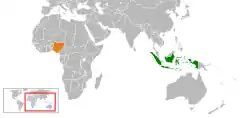Indonesia–Nigeria relations
Indonesia–Nigeria relations refers to the bilateral relations of Republic of Indonesia and Nigeria. Diplomatic relations were established in 1965.[1] Both countries are members of multilateral organizations such as the Non-Aligned Movement, World Trade Organization (WTO), Organisation of Islamic Cooperation (OIC) and Developing 8 Countries.
 | |
Indonesia |
Nigeria |
|---|---|
History
The diplomatic relations between the Federal Republic of Nigeria and the Republic of Indonesia date back to 1965, when Indonesia opened its resident diplomatic mission in Lagos. In 1976 Nigeria reciprocated by opening its mission in Jakarta. Nigeria was the first Sub-Saharan African country that established diplomatic mission in Indonesia.[1] Indonesia recognizes the important role played by Nigeria in Sub-Saharan region and has made Nigeria as its gate to West and Central Africa.
Country comparison
| Country | ||
|---|---|---|
| Area | 1,904,569 square kilometres (735,358 sq mi) | 923,768 square kilometres (356,669 sq mi) |
| Population | 261,115,456 (2016) | 198,577,125 (2017) |
| Pop. density | 138 inhabitants per square kilometre (360/sq mi) | 215 inhabitants per square kilometre (560/sq mi) |
| Capital | Jakarta | Abuja |
| Largest city | Jakarta – 10,075,310 (30,214,303 Metro) | Lagos – 16,060,303 (21,000,000 Metro) |
| Government | Unitary presidential constitutional republic | Federal presidential constitutional republic |
| Language(s) | Indonesian (official) | English (official) |
| Religions | 87.2% Islam, 9.9% Christianity, 1.7% Hinduism, 0.7% Buddhism, 0.2% Confucianism | 51.0% Christianity, 47.8% Islam, 1.2% Others |
| Ethnic groups | 42.6% Javanese, 15.4% Sundanese, 3.4% Malays, 3.3% Madurese, 3% Batak, 2.7% Minangkabau, 2.5% Betawi, 2.4% Bugis, etc. | 27.4% Hausa, 14.1% Igbo, 13.9% Yoruba, 6.3% Fulani, 2.2% Ibibio, 2.2% Tiv, 2.0% Ijaw, 1.7% Kanuri |
| GDP | $1.074 trillion (nominal, 2018); $3.492 trillion (PPP, 2018) | $0.376 trillion (nominal, 2017); $1.121 trillion (PPP, 2017) |
| GDP per capita | $4,051 (nominal, 2018); $13,162 (PPP, 2018) | $2,758 (nominal, 2017); $6,184 (PPP, 2017) |
| GDP growth rate | 5.1% (2017) | 4.8% (2018) |
| Main industries | Palm oil, coal, petroleum, textiles | Cement, petroleum refining, construction materials, food processing |
| Labor force | 125 million (2016) | 74 million (2015) |
| HDI | 0.707 (High) | 0.534 (Low) |
State visits and meetings
There have also been an exchange of visits at the highest level, by former President Abdurrahman Wahid who visited Nigeria in 2001 and former President Olusegun Obasanjo who visited Indonesia three times in 2001, 2005 and 2006.[2]
President Umaru Musa Yar'Adua and President Susilo Bambang Yudhoyono of Indonesia met in New York in 2007 and agreed to strengthen further economic relations between the two countries by increasing trade and encouraging investment.[1] In February 2013, Yudhoyono visited Abuja accompanied by 99 businessmen to strengthen trade relations,[3] and met Nigerian President Goodluck Jonathan.[4]
Cooperations
In 2001, Indonesia and Nigeria signed the Economic and Technical Cooperation Agreement, and establish the Joint Commission. The two countries in February 2013 signed multi-billion long-term agreements on airlines and aircraft maintenance. The agreement and contracts are between Garuda Maintenance Facility Aeroasia, Indonesia, with its Nigerian counterparts, including Kabo Air, Silverback Africa, Hak Air, Max Air and Service Air Ltd.[5] In March 2007, an MOU was signed between the Economic and Financial Crimes Commission (EFCC) and the Corruption Eradication Commission of Indonesia (KPK).[1] Other draft MOU/Agreements exchanged between the two countries include cooperation in trade, reciprocal promotion and protection of investment, agriculture, gas, and illicit drugs.[1]
Economic relations
Nigeria is Indonesia's second largest trade partner in Africa after South Africa, in 2011 the trade value reached US$2.09 billion accounted for 21.66 percent of Indonesia's total trade with Africa.[6] In 2013, the bilateral trade volume between the countries hits $2.2 billion. There are over 15 Indonesian companies currently operating in Nigeria such as Indorama, Indofood, Kalbe Farma and Sayap Mas Utama. Indofood for example had established instant noodle factory in Nigeria since 1995 where Indomie has become a popular brand and have the largest instant noodles manufacturing plant in Africa. The two countries also planning a US$2.5 billion gas methanol and fertilizer plant in Nigeria with Pertamina of Indonesia and NNPC of Nigeria in collaboration with Eurochem Indonesia and Viva Methanol of Nigeria.
Notes
- "Country Profile: 'Nigeria National Day' Nigeria-Indonesia Relations". The Jakarta Post. September 29, 2008. Retrieved 8 June 2013.
- Sudirman Haseng (17 August 2012). "Nigeria-Indonesia, people to people". Nigerian Guardian News. Archived from the original on 8 August 2013. Retrieved 8 August 2013.
- Yang Lina (3 February 2013). "Indonesian president arrives Nigeria with trade delegation". Xinhua. Retrieved 8 August 2013.
- "Visit of President Yudhoyono of Indonesia". News Agency of Nigeria. 2 February 2013. Retrieved 8 August 2013.
- Daniel Anozie (February 6, 2013). "Feeling fly: Nigeria, Indonesia sign MoU on aircraft maintenance". YNaija.com. Retrieved 8 June 2013.
- "Exploring Africa, Mainstreaming Indonesia's Economic Diplomacy in Non-traditional Market". Centre for Policy Analysis and Development on Asia-Pacific and African Regions, Policy Analysis and Development Agency. Ministry of Foreign Affair of the Republic of Indonesia: 80. 2012.

